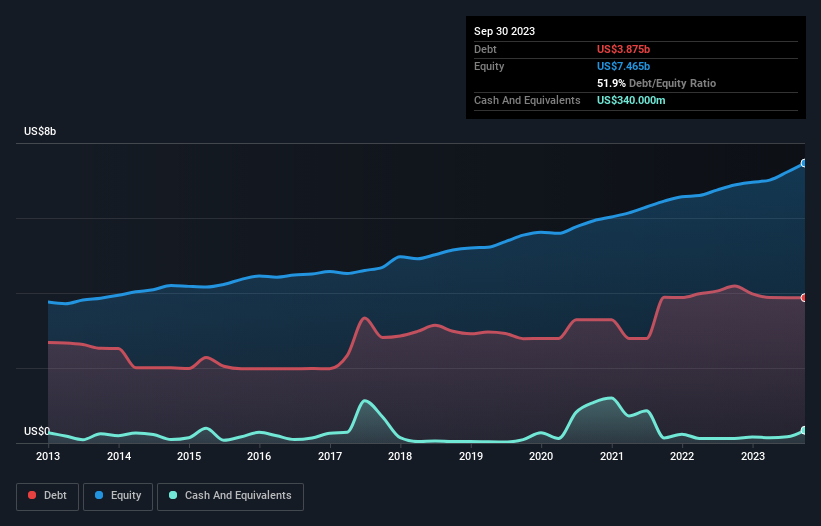- United States
- /
- Basic Materials
- /
- NYSE:VMC
Here's Why Vulcan Materials (NYSE:VMC) Can Manage Its Debt Responsibly

Some say volatility, rather than debt, is the best way to think about risk as an investor, but Warren Buffett famously said that 'Volatility is far from synonymous with risk.' So it might be obvious that you need to consider debt, when you think about how risky any given stock is, because too much debt can sink a company. Importantly, Vulcan Materials Company (NYSE:VMC) does carry debt. But should shareholders be worried about its use of debt?
When Is Debt A Problem?
Debt assists a business until the business has trouble paying it off, either with new capital or with free cash flow. Part and parcel of capitalism is the process of 'creative destruction' where failed businesses are mercilessly liquidated by their bankers. However, a more common (but still painful) scenario is that it has to raise new equity capital at a low price, thus permanently diluting shareholders. Of course, the upside of debt is that it often represents cheap capital, especially when it replaces dilution in a company with the ability to reinvest at high rates of return. The first step when considering a company's debt levels is to consider its cash and debt together.
Check out our latest analysis for Vulcan Materials
How Much Debt Does Vulcan Materials Carry?
The image below, which you can click on for greater detail, shows that Vulcan Materials had debt of US$3.87b at the end of September 2023, a reduction from US$4.19b over a year. However, it does have US$340.0m in cash offsetting this, leading to net debt of about US$3.53b.

How Strong Is Vulcan Materials' Balance Sheet?
Zooming in on the latest balance sheet data, we can see that Vulcan Materials had liabilities of US$864.2m due within 12 months and liabilities of US$6.29b due beyond that. On the other hand, it had cash of US$340.0m and US$1.18b worth of receivables due within a year. So its liabilities outweigh the sum of its cash and (near-term) receivables by US$5.63b.
Of course, Vulcan Materials has a titanic market capitalization of US$29.9b, so these liabilities are probably manageable. Having said that, it's clear that we should continue to monitor its balance sheet, lest it change for the worse.
We measure a company's debt load relative to its earnings power by looking at its net debt divided by its earnings before interest, tax, depreciation, and amortization (EBITDA) and by calculating how easily its earnings before interest and tax (EBIT) cover its interest expense (interest cover). This way, we consider both the absolute quantum of the debt, as well as the interest rates paid on it.
Vulcan Materials's net debt is sitting at a very reasonable 1.9 times its EBITDA, while its EBIT covered its interest expense just 6.7 times last year. While these numbers do not alarm us, it's worth noting that the cost of the company's debt is having a real impact. We note that Vulcan Materials grew its EBIT by 23% in the last year, and that should make it easier to pay down debt, going forward. When analysing debt levels, the balance sheet is the obvious place to start. But ultimately the future profitability of the business will decide if Vulcan Materials can strengthen its balance sheet over time. So if you're focused on the future you can check out this free report showing analyst profit forecasts.
Finally, while the tax-man may adore accounting profits, lenders only accept cold hard cash. So we clearly need to look at whether that EBIT is leading to corresponding free cash flow. Over the most recent three years, Vulcan Materials recorded free cash flow worth 52% of its EBIT, which is around normal, given free cash flow excludes interest and tax. This free cash flow puts the company in a good position to pay down debt, when appropriate.
Our View
Happily, Vulcan Materials's impressive EBIT growth rate implies it has the upper hand on its debt. And its interest cover is good too. All these things considered, it appears that Vulcan Materials can comfortably handle its current debt levels. Of course, while this leverage can enhance returns on equity, it does bring more risk, so it's worth keeping an eye on this one. There's no doubt that we learn most about debt from the balance sheet. But ultimately, every company can contain risks that exist outside of the balance sheet. For example - Vulcan Materials has 2 warning signs we think you should be aware of.
When all is said and done, sometimes its easier to focus on companies that don't even need debt. Readers can access a list of growth stocks with zero net debt 100% free, right now.
New: Manage All Your Stock Portfolios in One Place
We've created the ultimate portfolio companion for stock investors, and it's free.
• Connect an unlimited number of Portfolios and see your total in one currency
• Be alerted to new Warning Signs or Risks via email or mobile
• Track the Fair Value of your stocks
Have feedback on this article? Concerned about the content? Get in touch with us directly. Alternatively, email editorial-team (at) simplywallst.com.
This article by Simply Wall St is general in nature. We provide commentary based on historical data and analyst forecasts only using an unbiased methodology and our articles are not intended to be financial advice. It does not constitute a recommendation to buy or sell any stock, and does not take account of your objectives, or your financial situation. We aim to bring you long-term focused analysis driven by fundamental data. Note that our analysis may not factor in the latest price-sensitive company announcements or qualitative material. Simply Wall St has no position in any stocks mentioned.
About NYSE:VMC
Vulcan Materials
Produces and supplies construction aggregates in the United States.
Average dividend payer with acceptable track record.
Similar Companies
Market Insights
Community Narratives



